
Jane Austen's sister burned her letters – but why?
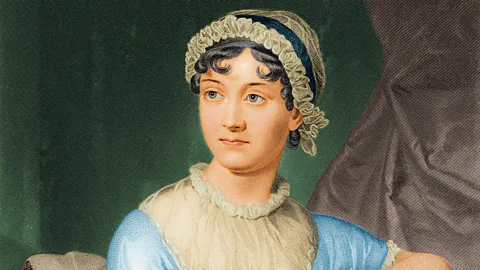 Alamy
AlamyAusten is one of the greatest writers in the English language – but relatively little is known about her. And that's in part because of an act that infuriates many to this day, which is the subject of new TV drama Miss Austen.
In early January 1796, 20-year-old Jane Austen wrote a gossipy letter to her beloved older sister, Cassandra. It had news of Jane's current crush, "a very gentlemanlike, good-looking, pleasant young man". Tom Lefroy was an Irish lawyer with whom Jane had cut a rug at three balls. She playfully urged her sister: "Imagine to yourself everything most profligate and shocking in the way of dancing and sitting down together." She was already looking forward to their next encounter and she wrote again to Cassandra just a few days later. In this letter, she offered to let their friend Mary have "all my other admirers" because she had eyes only for Tom. However, Tom had to leave the country and in the same note she wrote: "At length the day is come on which I am to flirt my last with Tom Lefroy, and when you receive this it will be over. My tears flow as I write at the melancholy idea."
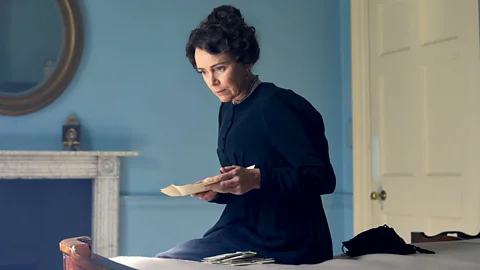 Keeley Hawes plays Jane Austen's sister in new BBC drama Miss Austen (Credit: BBC)
Keeley Hawes plays Jane Austen's sister in new BBC drama Miss Austen (Credit: BBC)These letters, the earliest of Jane's that we have, suggest a vivacious, flirtatious, funny young woman who enjoys parties and dancing and the attention of the opposite sex. It's a vivid picture, and all the more precious because so few of Jane's letters survive. She was a prolific correspondent, estimated to have written thousands of letters during her lifetime, and yet we have only 160 of them. Years after Jane's death in 1817 from an unknown illness, Cassandra, to whom her sister had written most days when they were apart, burned almost all of her letters.
I imagine they would have contained a lot of indiscreet mentions of annoying relatives – Gill HornbyHer deed has puzzled and infuriated historians and biographers. Jane Austen is one of the greatest writers in the English language, second only to Shakespeare in the view of many. Her six novels – witty, withering and psychologically perceptive, pioneering in form and content – are still hugely popular today, as are screen adaptations, of which there are many. Yet beyond basic biographical facts, information about Jane is relatively scant. Was she, as has been claimed, a secret radical? A lesbian? Poisoned? How much more would we know about her had Cassandra, her main champion in life and the keeper of her flame after her death, preserved her letters? What secrets must they have held that Cassandra thought it best to burn them?
The different theoriesThis mysterious act of destruction is investigated in Miss Austen, a new four-part television drama based on Gill Hornby's best-selling and critically acclaimed novel of the same name. Years after Jane's death, Cassandra (Keeley Hawes) has travelled to the village of Kintbury, in Berkshire, where the Austen family's friends, the Fowles, lived. Cassandra is, ostensibly, there to help Isabella Fowle (Rose Leslie), whose father Fulwar is dying. However this is a house that holds many bitter-sweet memories for her (in real life, this is where she had been staying when Jane wrote to her about Tom Lefroy), and she has an ulterior motive. She wants to retrieve some letters written by the late Jane to their friend Eliza Fowle, Isabella's mother, which she fears might contain details damaging to the novelist's legacy. When she finds the correspondence, it revives powerful memories of the events of years ago. The series takes place in two timelines – in 1830 – with the unmarried Isabella facing eviction from her home after her father's death and Cassandra trying to protect her sister's legacy – and decades previously, with young Cassandra (Synnøve Karlsen) and Jane (Patsy Ferran) navigating romances, family problems, and the ups and downs of life.
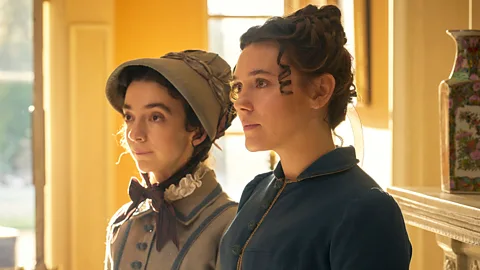 Flashbacks in Miss Austen show young Jane (Patsy Ferran) and Cassandra (Synnøve Karlsen), and the ups and downs they faced (Credit: BBC)
Flashbacks in Miss Austen show young Jane (Patsy Ferran) and Cassandra (Synnøve Karlsen), and the ups and downs they faced (Credit: BBC)Hornby became interested in Cassandra after moving to Kintbury, and learning that "Miss Austen" had been engaged to the son of the vicar of the local church. On the reason for the bonfire of the letters, Hornby tells BBC Culture: "I have my own theory, as put out in the novel, and which I think stands up." Viewers of the series will discover it in due course.
"But there are other, prosaic reasons," she continues. "One is that these letters were newsy, gossipy. Those two shared everything – including very difficult sisters-in-law [Jane and Cassandra had six brothers]. I imagine there would have been a lot of indiscreet mentions of annoying relatives, and Cassandra would have wanted to avoid any future hurt feelings. There would also have been quite a lot of moaning. Jane worried about money incessantly – there are still many mentions left over to prove it. So all in all, they wouldn't necessarily show her in the best light."
More like this:
• What Jane Austen can teach us about resilience
• The racy side of Jane Austen
• 40 of the most exciting books to read in 2025
Devoney Looser is Regents Professor of English at Arizona State University and a respected authority on Jane Austen. "A less often considered theory, which I think probable, is that Cassandra may also have been watching closely, in the early 1840s, the brutal treatment that critics were dishing out in reviews of the recently published letters of the late novelist Frances Burney," she tells the BBC. Burney was a writer of social comedies, who Austen grew up reading and took inspiration from.
Cassandra's reputation as the most notorious destroyer of Jane's letters isn't entirely fair – Devoney Looser"Those cruel reviews would have given Cassandra pause, considering that Jane's letters might have faced similar treatment. They might have been skewered in the early Victorian press, if published then. Of course, almost two centuries later, I think we can be confident that the opposite would eventually have been true – that these additional Austen letters would be welcomed and admired. That part is especially crushing."
However both Looser and Hornby defend Cassandra in what she did. Indeed, Hornby wrote Miss Austen at least partly with the intention of explaining her actions.
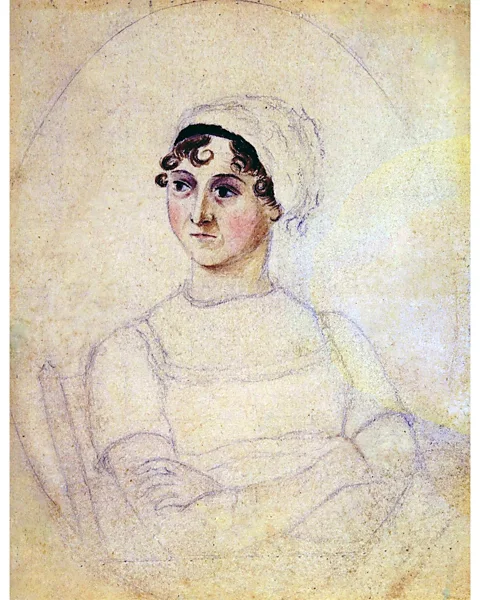 Getty ImagesThis pencil and watercolour portrait of Jane by Cassandra (seen here colourised) is the only authenticated picture of the novelist (Credit: Getty Images)
Getty ImagesThis pencil and watercolour portrait of Jane by Cassandra (seen here colourised) is the only authenticated picture of the novelist (Credit: Getty Images)"Whatever her motives, the truth is – however biographers might complain – Cassandra did the right thing. Jane was a very private person," says Hornby, pointing to the fact that she chose to be published anonymously for the duration of her lifetime, with her identity only being widely revealed by her brother Henry in December 1817, via the biographical note he wrote for a posthumous edition of Persuasion and Northanger Abbey. "She had no interest in fame, only writing," Hornby continues. "Both sisters would be horrified to think of us knowing their secrets. And the fact that – thanks to Cassandra's bonfire – we know so little about the author has proved wildly successful. That element of mysterious, quiet dignity is crucial to the success of the Jane Austen brand."
Looser says: "Cassandra's reputation as the most notorious destroyer of Jane's letters isn't entirely fair. As a few scholars have recently pointed out, Cassandra is also the only Austen sibling who is known to have saved large numbers of her sister's letters. That said, of course I find it deeply upsetting that any of Jane's letters were ever destroyed. It's clear that they must have held more of her characteristic humour and social insights, as well as requisite everyday news and gossip."
A sisterly love storyJane and Cassandra, who was older by three years, had a very close bond. They were the only daughters of a Hampshire clergyman. According to their mother, "if Cassandra's head had been going to be cut off, Jane would have hers cut off too". They lived together for much of their lives, and Cassandra was the only person with whom Jane discussed her work. A pencil and watercolour likeness by Cassandra is the only authenticated picture of Jane. The day after Jane's death, Cassandra wrote in a letter: "She was the sun of my life, the gilder of every pleasure, the soother of every sorrow. It is as if I have lost a part of myself." Neither woman married.
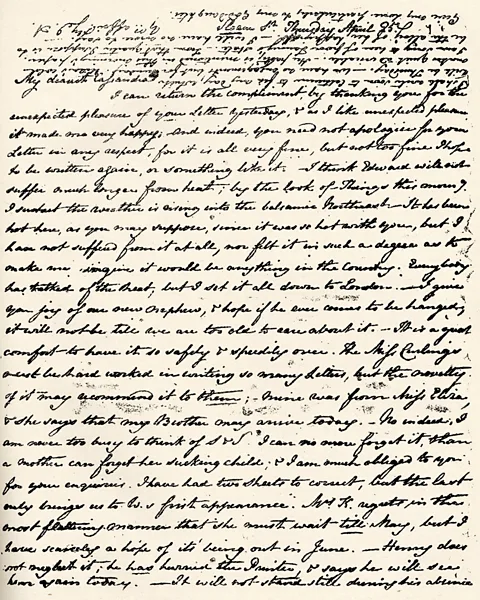 Getty ImagesOne of the relatively few letters from Jane Austen to Cassandra that does survive today (Credit: Getty Images)
Getty ImagesOne of the relatively few letters from Jane Austen to Cassandra that does survive today (Credit: Getty Images)In fact, the mystery element of Hornby's novel is simply the delivery mechanism for a moving exploration of unmarried women's lack of control over their own lives in this period. They often had little or no money and could well be dependent on the charity of relatives – which might or might not be forthcoming.
"The subjugation of women was the dominant theme in their existence," says Hornby. "Their lives were an obstacle course, and dodging the pitfalls was part of their every day. We don't see it, of course, because we live with so many options ourselves. But Austen's novels are all about the subjugation of women. All of her heroines – bar Emma – are in peril at the beginning. Those Bennet girls [from Pride and Prejudice] – once their father died, they would have no money, no home. Marriage is their only rescue plan – as Mrs Bennet so wisely sees. We read her as a comic creation – and of course, she is played for laughs. But actually, she's the sensible one who can see the great dangers ahead."
Andrea Gibb, who has adapted Miss Austen for the screen, says she fell in love with the book immediately. "It's so beautifully conceived, and could have been written by Austen herself. It has everything. Intrigue, mystery, romance and love. Not just romantic love but the enduring lifelong love that exists between sisters. The female experience is very much at the heart of the story. Women then were totally financially dependent on men. Making a good marriage was a survival mechanism as much as a romantic ideal."
This year is the 250th anniversary of Jane Austen's birth. As well as Miss Austen, the BBC has commissioned The Other Bennet Sister, a Pride and Prejudice spin-off drama about Mary Bennet based on the novel by Janice Hadlow. Netflix is reported to have an adaptation of Pride and Prejudice in the works. And in a book published later this year, Wild for Austen: A Rebellious, Subversive, and Untamed Legacy, Looser hopes to demolish "the continuing myth that Austen was mild, prim and boring," she says. Jane Austen's appeal shows absolutely no signs of abating.
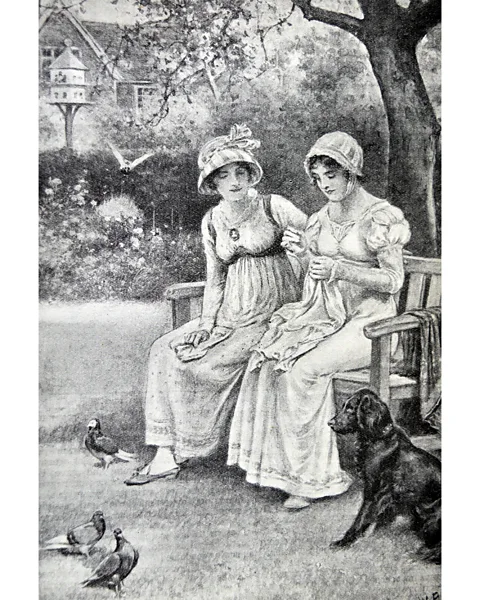 Getty ImagesAn engraving of Jane and Cassandra doing needlework together, dated 1810 (Credit: Getty Images)
Getty ImagesAn engraving of Jane and Cassandra doing needlework together, dated 1810 (Credit: Getty Images)"I think she endures because she deals with universal concerns and she shines a light on society and its inherent contradictions," says Gibb. "I think she has a lot to say to contemporary women. Whether they're young and full of idealism or whether they're older. She's a great recorder of human behaviour and she's also very funny."
And let's not judge Cassandra too harshly. After all, who among us would want our gossipy missives and messages to our nearest and dearest read by all and sundry?
Miss Austen premieres on 2 February on BBC1 in the UK, and on 4 May on MASTERPIECE on PBS in the US.
--
If you liked this story, sign up for The Essential List newsletter – a handpicked selection of features, videos and can't-miss news, delivered to your inbox twice a week.
For more Culture stories from the BBC, follow us on Facebook, X and Instagram.
BooksBritish literatureWomen's HistoryHistoryLiteratureFeaturesWatch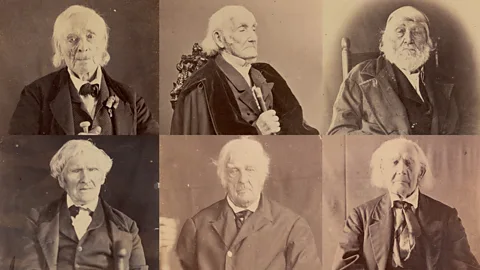 America's last Revolutionaries: Rare photos of US patriots
America's last Revolutionaries: Rare photos of US patriotsHow a dwindling group of veterans from the American War of Independence were featured in early photographic form.
7 Jan 2025History Idris Elba on moment he learned about Mandela's death
Idris Elba on moment he learned about Mandela's deathThe actor recalls being at the Mandela film premiere when he heard the anti-apartheid politician had died.
7 Dec 2024History Why Cher has waited until now to write her memoir
Why Cher has waited until now to write her memoirCher explains why she has finally written her memoir and who it's for.
2 Dec 2024Books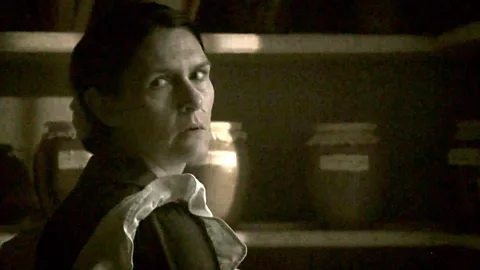 Mary Mallon: 'The most dangerous woman in America'
Mary Mallon: 'The most dangerous woman in America'How Mary Mallon, an Irish cook for New York's elite, became known as the 'most dangerous woman in America'.
17 Nov 2024History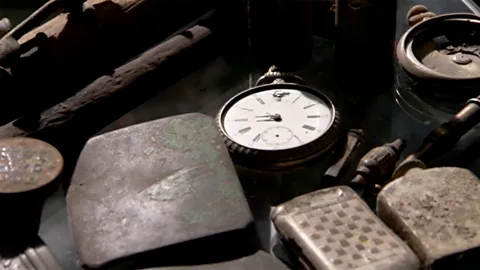 World War One relics live on in the fields of Europe
World War One relics live on in the fields of EuropeThe battlegrounds of World War One are still giving up their revealing evidence of bitter fighting.
12 Nov 2024History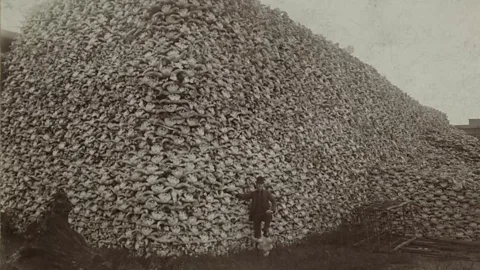 The picture that tells a lesser-known chapter of US history
The picture that tells a lesser-known chapter of US historyHow a 1892 photo from Rougeville, Michigan, became the most iconic image of the bison massacre in America.
22 Oct 2024History The history of swing states in the US
The history of swing states in the USThe US Presidential elections did not always depend on just these seven states.
21 Oct 2024History Why tonnes of mummified cats ended up in England
Why tonnes of mummified cats ended up in EnglandIn 1890 an estimated cargo of 180,000 ancient felines, weighing 19.5 tonnes, were auctioned off in Liverpool.
18 Sep 2024History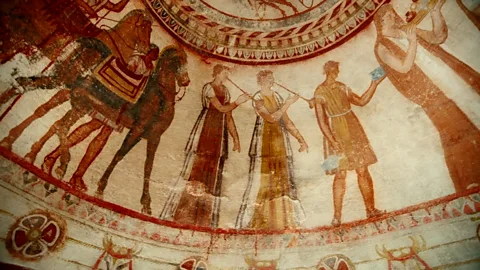 Inside the ancient royal tomb found by accident
Inside the ancient royal tomb found by accidentThe Thracian Tomb of Kazanlak was accidentally discovered by Bulgarian soldiers digging up shelters in 1944.
11 Sep 2024Archaeology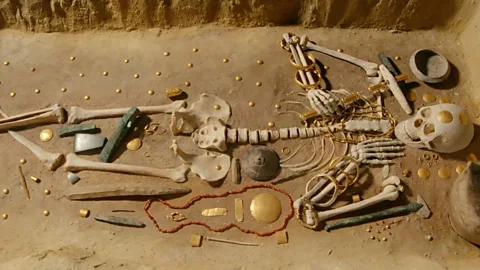 Varna Necropolis: World's oldest gold treasure
Varna Necropolis: World's oldest gold treasureThe Varna treasure is considered the world's oldest human processed gold, dating back 6,500 years.
10 Sep 2024Archaeology The giant 350-year-old model of St Paul's Cathedral
The giant 350-year-old model of St Paul's CathedralHiding in a London cathedral is an intricate wooden mock-up of Sir Christopher Wren's masterpiece.
5 Sep 2024History Uncovering the sunken relics of an ancient city
Uncovering the sunken relics of an ancient cityBettany Hughes goes underwater in search of ancient archaeological finds in historic Sozopol, Bulgaria.
4 Sep 2024Archaeology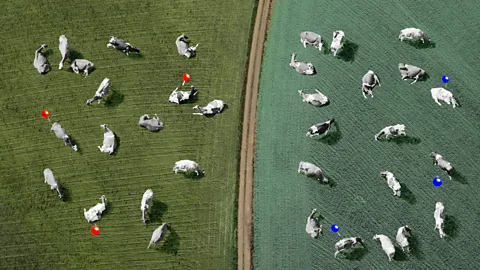 Texas fever: The lesser-known history of the US border
Texas fever: The lesser-known history of the US borderIn 1911, a fence was constructed on the US-Mexico border. But its purpose was not to stop humans.
18 Aug 2024History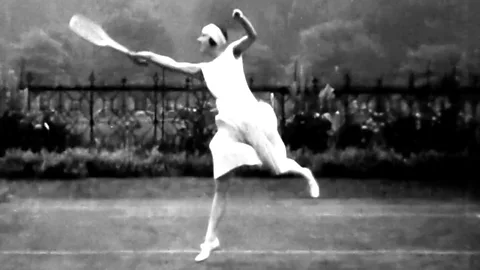 Century-old Olympics footage brought back to life
Century-old Olympics footage brought back to lifeA look through footage from the Paris 1924 Olympics gives viewers a chance to reflect on how much has changed.
9 Aug 2024Sport The rare medieval street about to reveal its secrets
The rare medieval street about to reveal its secretsOne of Europe's oldest residential streets hides in the heart of the English countryside.
23 Jul 2024History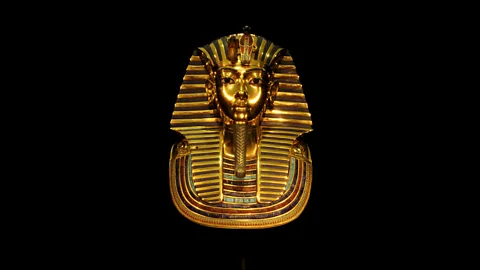 Tutankhamun: The first ever view inside the tomb
Tutankhamun: The first ever view inside the tombOne month after the famous discovery, photographer Harry Burton recreated the first view of Tutankhamun's tomb.
5 Jul 2024History Listen to the oldest known recording of a human voice
Listen to the oldest known recording of a human voiceThomas Edison wasn't the first person to record sound. It was a Frenchman who invented sound recording in 1857.
3 Jul 2024History D-Day veteran remembers: We didn't have time to be scared
D-Day veteran remembers: We didn't have time to be scaredOn the 80th anniversary of D-Day, veterans who were on the beaches of Normandy recount that fateful day.
5 Jun 2024History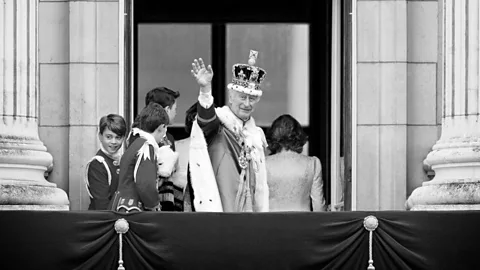 King Charles: One year since the Coronation
King Charles: One year since the CoronationHow does King Charles III's Coronation year compare to that of his mother?
7 May 2024History The song that ended Europe's longest running fascist regime
The song that ended Europe's longest running fascist regimeFifty years ago, on April 25, 1974, a Eurovision song gave the signal for a military coup.
25 Apr 2024HistoryMore30 mins ago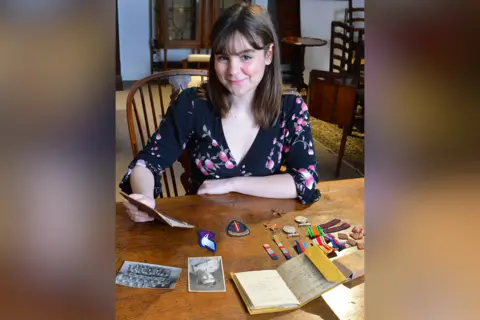 Rare special forces items go under the hammer
Rare special forces items go under the hammerThe items, belonging to Captain Leslie Scott, were found in an attic in North Duffield.
30 mins ago3 hrs ago Covid-19: The heat-showing shape of things to come
Covid-19: The heat-showing shape of things to comeIn January 2020, Thailand's authorities were amongst the first to have to grapple with a worrying new disease. The frontlines included the country's shopping malls.
3 hrs agoFuture4 hrs ago The most surprising balls of Vienna's ball season
The most surprising balls of Vienna's ball seasonWhile the formal dress and classic dances of the Vienna balls have prevailed since the early 1800s, some events are taking unique approaches to the tradition.
4 hrs agoTravel24 hrs ago A Chinese fashion influencer's guide to Hong Kong
A Chinese fashion influencer's guide to Hong KongAngelababy has called Hong Kong home since she was a young girl. Here are her local insider picks, from shopping on Hollywood Road to hiking Dragon's Back.
24 hrs agoTravel1 day ago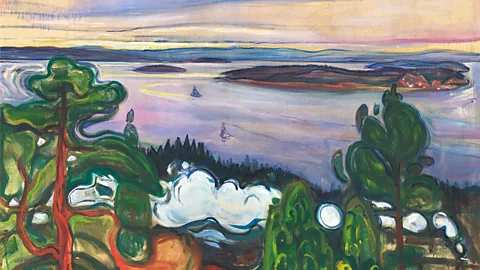 Six Nordic paintings that help us rethink winter
Six Nordic paintings that help us rethink winterWinter isn't all bad – these "sublime" landscapes of the frozen North from the turn of the 20th Century offer us a way into resilience – and an "acceptance of the seasonality of life".
1 day agoCultureAP by OMG
Asian-Promotions.com |
Buy More, Pay Less | Anywhere in Asia
Shop Smarter on AP Today | FREE Product Samples, Latest
Discounts, Deals, Coupon Codes & Promotions | Direct Brand Updates every
second | Every Shopper’s Dream!
Asian-Promotions.com or AP lets you buy more and pay less
anywhere in Asia. Shop Smarter on AP Today. Sign-up for FREE Product Samples,
Latest Discounts, Deals, Coupon Codes & Promotions. With Direct Brand
Updates every second, AP is Every Shopper’s Dream come true! Stretch your
dollar now with AP. Start saving today!
Originally posted on: https://www.bbc.com/culture/article/20250129-the-mystery-of-why-jane-austens-letters-were-destroyed-by-her-own-sister?ocid=global_culture_rss
